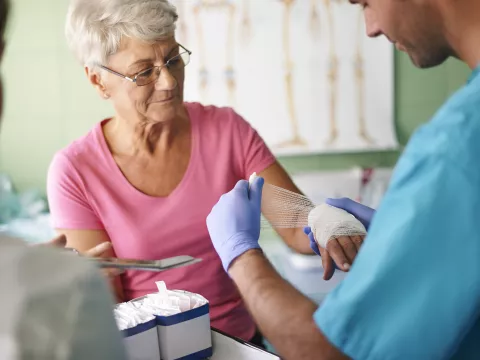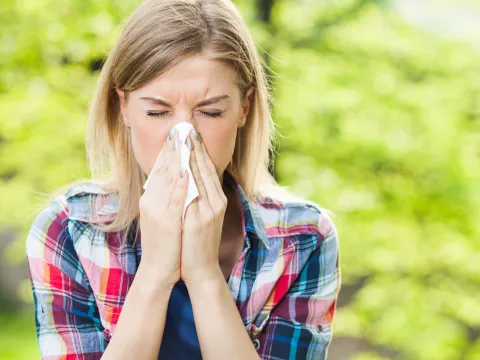- AdventHealth Centra Care

If you have an open wound you're not properly caring for, you may be putting yourself at risk of infection. Any infected wound can become a more serious infection that may cause life-threatening health issues like sepsis, staphylococci or tetanus.
Whether you have a minor wound or something more serious, we’re here to help you learn about the risk factors, different types of wounds and signs of infection that you should look for.
What Causes an Infected Wound?
Whether you have scrapes, sutures or surgical wound infections, all wounds are susceptible to infection—especially when not properly cared for. An infected wound is typically caused by harmful microorganisms, such as bacteria, viruses, or fungi, entering the wound site.
- Bacteria: The most common cause, including strains like Staphylococcus aureus and Streptococcus pyogenes
- Foreign objects: Dirt, debris, or splinters in the wound can introduce bacteria and hinder healing
- Poor hygiene: Not cleaning the wound properly or touching it with unwashed hands can introduce pathogens
- Compromised immune system: Individuals with weakened immune systems are more susceptible to infections
- Chronic conditions: Diabetes, poor circulation, and other chronic conditions can impair wound healing and increase infection risk
- Improper Wound Care: Inadequate or inappropriate wound dressing and care can lead to infection.
- Environmental exposure: Exposure to contaminated water, soil, or surfaces can introduce pathogens into the wound
- Delayed treatment: Not seeking timely medical care for severe wounds or deep lacerations increases the risk of infection
How to Prevent an Infected Wound
Taking care of open wounds can prevent infection. This is crucial because it promotes healing and prevents complications like increased pain, abscess formation, cellulitis, sepsis and chronic wounds, all of which can be life-threatening.
When you prevent infections, you'll lower your health care costs by reducing the need for further medical treatment or hospital stays. Effective wound infection prevention is key to ensuring proper wound healing and maintaining your whole health.
Step-by-Step Guide to Prevent Infections:
- Wash the wound with plenty of soap and warm water. Washing and disinfecting a wound is the most important step to ensure it doesn’t get infected.
- Remove dirt, debris and foreign particles from the wound. Leaving a foreign object in the wound is one of the leading causes of wound infections. Don’t use force or scrubbing, as this can increase trauma to the affected area.
- If the area is swollen, apply ice. Don’t use heat, as it can cause inflammation and worsen swelling.
- Use an antiseptic like rubbing alcohol, hydrogen peroxide or an antibiotic ointment on the affected area.
- Pack surgical wounds or deep wounds lightly with disinfected and clean gauze, but don’t tie the gauze tightly. Apply a bandage for minor cuts and scrapes.
- Ensure everything in contact with your wound is clean and sterile — including your hands.
Wound Infection Treatment: First Aid Tips
If your wound is already infected or you think it might be, seek immediate medical attention. Minor infections can quickly develop into more severe ones if not treated properly.
After you seek medical help, you'll need to maintain your wound care to continue the wound-healing process.
Treating infected wounds typically involves several steps focused on eliminating the infection, promoting healing and preventing complications. Infected wound treatment generally takes the following steps:
- Cleaning the Wound: The first step is to thoroughly clean the infected wound to remove any debris, dirt, and dead tissue. This may involve irrigation with saline solution and, in some cases, surgical debridement. Follow the steps listed above for proper care.
- Antibiotics: Depending on the severity of the infection, topical antibiotics may be applied directly to the wound. For more serious infections, intravenous or oral antibiotics may be prescribed to fight the infection systemically.
- Dressing the wound: Appropriate wound dressings protect the wound from further contamination and maintain a moist environment, which is conducive to healing. Dressing changes are done regularly to keep the wound clean and dry.
- Pain management: Pain and discomfort are managed with over-the-counter pain relievers like acetaminophen or ibuprofen, and sometimes prescription pain medications if necessary.
- Monitoring: Monitor the infected wound and look for signs of improvement or worsening. This involves regular check-ups with a health care provider to assess the healing process and make any necessary adjustments to the treatment plan.
- Treating underlying conditions: If there are underlying conditions such as diabetes or poor circulation that could impede healing, these need to be managed effectively.
By following a comprehensive treatment plan, you can effectively manage wound infections, leading to improved outcomes and faster wound healing. Check out our favorite first-aid kit essentials so you can keep your emergency kit stocked and ready.
Infected Wound Symptoms
While infected wound symptoms can vary in magnitude and effects, here are a few key symptoms to keep an eye on if your wound gets infected:
- Dizziness or fainting
- Fever
- Foul odor or drainage
- Increasing pain
- Non-healing wounds
- Puss discharge or buildup in and around the wound
- Red streaks around the affected area
- Swelling or bruising of the wound
Sometimes, the skin over an infected wound heals, but the infection is still deep within the wound. In such cases, an abscess can form inside the wound. A buildup of puss in the affected area is a sign this may be the case. If you have any of these symptoms, speak with a health care professional about getting the care you need.
Complications of Infected Wounds
Even minor wound infections can develop into serious health concerns. Major wound infections such as puncture wounds from animal bites, non-healing surgical wounds, or deeper wounds with worsening pain should be considered a medical emergency.
If your wound is infected and you do not seek medical attention, the wound area could develop into a more serious condition that requires further treatment. Here are some of the most common and most severe complications of infected wounds:
Most Common Complications:
- Slow healing: Most small wounds heal in about 4 to 24 days but can take up to 6 weeks to fully recover. Infected wounds take longer to heal, increasing the risk of further complications.
- Cellulitis: A bacterial infection of the surrounding skin and tissues beneath, which may cause mild redness, tissue damage, swelling and pain.
- Abscess formation: A skin infection causing inflammation because of pus that forms a pocket within the tissue, often requiring drainage.
- Chronic wound: Infections can lead to wounds that do not heal properly and become chronic.
- Scarring: There is an increased risk of significant scarring due to prolonged inflammation and damage.
Severe Complications:
- Sepsis: Sepsis is a life-threatening systemic infection that can lead to organ failure and death if not treated promptly.
- Necrotizing fasciitis: Also known as flesh-eating disease, a severe bacterial infection that rapidly destroys tissue.
- Osteomyelitis: This bone infection can cause severe pain and require long-term antibiotic therapy or surgery.
- Gangrene: Death of body tissue due to lack of blood supply often requires amputation to prevent spread.
- Lymphangitis: Infection of the lymphatic vessels can spread bacteria throughout the body.
- Tetanus: Tetanus is a bacterial infection causing muscle stiffness and spasms and is potentially life-threatening if not treated.
- Endocarditis: Infection of the inner lining of the heart chambers and valves can occur if bacteria enter the bloodstream.
- Systemic inflammatory response syndrome (SIRS): This is an extreme inflammatory response to infection that can lead to multiple organ failure.
If your wound is infected, contact an urgent care provider immediately for prompt and proper wound care.
When to Consult a Medical Provider
Most wound infections will heal on their own if you wash and treat them at home within 4 to 6 hours of the injury. However, if your wound displays one or more of the wound infection symptoms listed above, consult your medical provider or a wound care specialist as soon as possible.
We also encourage you to consult your medical provider if your wound falls into one of the following categories:
- It contains a foreign object
- It has not been cleaned or treated within eight hours
- It results from a puncture or animal bite
- The infection is a result of a surgical wound
- You have not had appropriate immunizations, such as a tetanus shot
People with certain conditions are also at a higher risk for developing infections. Those with diabetes, alcoholism and peripheral arterial disease are several high-risk conditions. If you suffer from any of these or have a weakened immune system, visit your nearest urgent care center as soon as possible if you have an infected wound.
Get the Care You Need from AdventHealth Centra Care
If you think it’s time to see a medical provider for an infected wound, AdventHealth Centra Care urgent care can provide immediate and compassionate care. We know what it takes to provide high-quality care and a comfortable experience.
Don't wait — prioritize your health and visit an AdventHealth Centra Care urgent care location near you today to ensure your wound heals properly and get back to feeling your best.
Schedule your visit or walk into one of our convenient locations today!
Recent Blogs
-

Pruebas de Influenza Cerca de Mí
Encuentre tratamiento contra la gripe cerca de Sanford ahora. Obtenga atención urgente para los síntomas de la gripe con pruebas y tratamiento de la gripe en una de nuestras ubicaciones de Sanford...
-

Tratamiento Rápido y Efectivo Contra La Influenza en Orlando, Florida
Este diciembre de 2022, ya estamos bien entrados en la temporada de gripe, y parece ser una de las temporadas de gripe más graves en más de una década.
